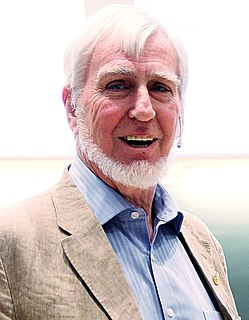A Quote by Steven Pinker
The elegant study... is consistent with the themes of modern cognitive neuroscience . Every aspect of thought and emotion is rooted in brain structure and function, including many psychological disorders and, presumably, genius. The study confirms that the brain is a modular system comprising multiple intelligences, mostly nonverbal.
Related Quotes
Cognitive neuroscience is entering an exciting era in which new technologies and ideas are making it possible to study the neural basis of cognition, perception, memory and emotion at the level of networks of interacting neurons, the level at which we believe many of the important operations of the brain take place.
Human beings are powered by emotion, not by reason. Study after study has proven that if the emotion centers of our brain are damaged in some way, we don't just lose the ability to laugh or cry, we lose the ability to make decisions. Alarm bells for every business right there. The neurologist Donald Calne puts it brilliantly: “The essential difference between emotion and reason is that emotion leads to action while reason leads to conclusions.”
In studying language we can discover many basic properties of this cognitive structure, its organization, and also the genetic predispositions that provide the foundation for its development. So in this respect, linguistics, first of all, tries to characterize a major feature of human cognitive organization. And second, I think it may provide a suggestive model for the study of other cognitive systems. And the collection of these systems is one aspect of human nature.
One of the things cognitive science teaches us is that when people define their very identity by a worldview, or a narrative, or a mode of thought, they are unlikely to change-for the simple reason that it is physically part of their brain, and so many other aspects of their brain structure would also have to change; that change is highly unlikely.
What Warcollier demonstrated is compatible with what modern cognitive neuroscience has learned about how visual images are constructed by the brain. It implies that telepathic perceptions bubble up into awareness from the unconscious and are probably processed in the brain in the same way that we generate images in dreams. And thus telepathic “images” are far less certain than sensory-driven images and subject to distortion.
The brain is a dynamic system that constantly processes and creates your reality. It works best if you balance all the things that the brain is good at. The brain is good at being adaptable, flexible, creative, and intelligent. But it's also good at playing and just being. A balanced life provides time - every day if possible - so that every function of the brain is allowed to come alive and flourish.
Since functional brain imaging first emerged, we have learned that there aren't very many brain regions uniquely responsible for specific tasks; most complex tasks engage many if not all of the brain's major networks. So it is fairly hard to make general psychological inferences just from brain data.
Most of our brain cells are glial cells, once thought to be mere support cells, but now understood as having a critical role in brain function. Glial cells in the human brain are markedly different from glial cells in other brains, suggesting that they may be important in the evolution of brain function.





































